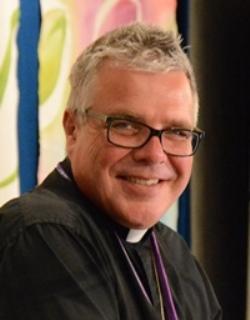
Wind, fire and a group of fearful friends. And then suddenly the Spirit descends and all is utterly, eternally, irrevocably changed. The once fearful disciples cringe no longer. Wishful thinking and timid whispers yield to a bold proclamation of passion and resurrection. Jesus’ disciples are quite literally given a “second wind” and in that instant the Church of Jesus Christ is born.
Pity the poor lector who’s assigned for Pentecost Sunday! Parthians, Medes, Elamites, Mesopotamians, Phrygians, Pamphylians, Cappadocians etc. etc. What a strange combination of participants! But we shouldn’t be surprised. The Christian community as described within the New Testament is characterized by some amazing combinations of people; Jews, Samaritans and Romans, rich and poor, slave and free, male and female. And for some, both then and today, this is a frightening prospect.
Some years ago I was at a continuing education event where Susan Briehl shared the story of a friend whose two daughters were preparing for the impending birth of a third child. The youngest of the two seemed to be adapting to the idea of an expanded family quite well, but the eldest seemed to be focussed on this coming birth in an excessive way. She was always asking questions. “Where will the new baby sleep? Where will the new baby sit when we eat supper? Where will the new baby go in the car?”
Finally the mother sat down with her daughter and asked her if anything was bothering her about this new baby. “Are you worried about something?” And it was then, that the real question came out. The little girl said, “Well, whenever we go out, you hold my hand and daddy holds Sonja’s hand. So when the new baby comes, whose hand won’t get held?”
There’s a sense in which this describes our natural response to the kingdom’s radical inclusiveness. Part of us feels that if God’s embrace is defined too widely, if it were to really include those who are different from ourselves – both young and old, black and the white, men and women, gay and the straight, weak and strong, rich and the poor – we might somehow end up with nobody holding our hand.
In the Gospel accounts Jesus promises that he will never leave us orphaned. He will never let go of our hands! But those same accounts also call us to reach out and grasp the hands of others. Indeed, this is one of the primary themes of the Gospel narrative. Over and over again we encounter a kingdom wherein people who are in the darkness of separateness and aloneness and are called out of isolation and into the light of a new community.
Each Pentecost Sunday, as the party is ended and the candles are extinguished, we are sent forth to help fulfil God’s birthday wish for the world! In part, that involves becoming a more visible sign of the kingdom’s wonderful diversity. It means expanding the circle and grasping hands that have previously been spurned. It means going beyond the safety of our comfortable definitions of who is in and who is out, and to follow the light of God’s presence to whomever and wherever that light might take us. May God grant us the faith and courage to make that journey.
